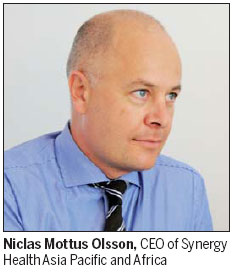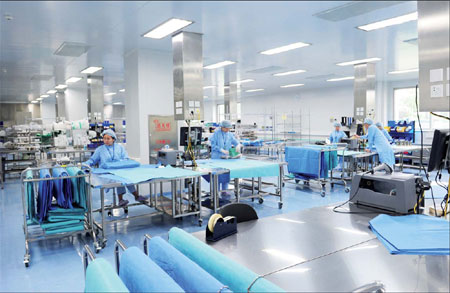The excitement of sterile services
Updated: 2013-05-10 08:50
By Cecily Liu and Zhang Chunyan (China Daily)
|
|||||||||||
|
Synergy Health has expanded globally to more than 1,000 hospitals in 15 countries. Provided to China Daily |

Hygiene company carves a niche for itself where previously there was none
When Synergy Health expanded into China in 2009, some considered it a courageous move because the concept of outsourcing sterile services to third-party providers was new to Chinese hospitals.
Four years later, Synergy Health's China team has not only taken on 61 healthcare institutions and 30 medical device companies as customers, it has helped a new cost saving strategy to gain acceptance in China's healthcare industry.
Niclas Mottus Olsson, CEO of Synergy Health Asia Pacific and Africa, says his team has received great feedback from Chinese customers, with one hospital in the city of Wuzhong reporting savings on sterile services of up to 75 percent.
"These savings are being used to provide even better care, and on top of the financial improvements there are also significant quality improvements that directly benefit the patients," he says.
Based on the concept of collective sterile services to maintain standards while driving costs down through economies of scale, Synergy Health was founded in Northamptonshire, in the English Midlands, in 1991.
The company started providing sterile services to the UK's National Health Service hospitals in 1996, when these hospitals first started looking at how to outsource sterile services while maintaining infection control and quality standards.
The company has since expanded internationally to serve more than 1,000 hospitals in 15 countries, including Europe, the Americas, the Middle East, Asia and Africa.
Synergy Health was listed on London's junior stock market in 2001, and as the company grew it transferred to the main exchange in 2008. For the year ended April 2012, its revenue totaled 312 million pounds ($486 million; 370 million euros). Globally, it employs 4,600 staff, with 110 in China.
Olsson says Synergy Health started looking at the Chinese market in 2007, for two key reasons.
First, many medical device and consumable manufacturing businesses with which Synergy Health already worked were moving their operations to China, so Synergy Health wanted to follow them and supply them in the local Chinese market.
Meanwhile, a delegation from the Chinese Ministry of Health came to the UK to learn how the NHS had improved efficiency through methods including the outsourcing of sterile services.
"A dialogue started between some of the ministry officials and Synergy Health, with a suggestion from Beijing that Synergy Health consider putting in a pilot operation in China to explore the possibility for sterile service outsourcing there," Olsson says.
He says another factor that created a market for Synergy Health in China was the establishment of a Central Sterile Supply Department in China in 2009, which was charged with inspecting the sterilization of medical devices.
"As a result many hospitals started aiming for total service solutions, which led to requests for global leading outsourced service providers like Synergy Health," Olsson says.
In 2009, Synergy Health established a sterile services facility inside Suzhou Industrial Park, and the Suzhou government supported Olsson's team.
Another attraction of Suzhou was its convenient access to Shanghai, Zhejiang and Jiangsu, he says. The industrial park is also home to many multinational medical device manufacturers that were already Synergy Health's customers.
The company's first customer in China was Suzhou Municipal Hospital. "The director of the hospital was very keen to try new concepts and he could clearly see the benefits of outsourcing his sterile services to an off-site location," Olsson says.
To better understand and satisfy the hospital's sterile services needs, Synergy Health invited its nursing staff to work with its team on secondment for several months, ensuring a smooth transition of the service out of the hospital, Olsson says.
After the sterile services went offsite, the hospital then renovated and refurbished the original sterile services space and turned it into a new revenue-generating wing of its maternity center.
"Synergy Health is proud that most of the babies born in Suzhou in recent years were not just born in the municipal hospital, but were likely born in the maternity center that was only able to be realized after Synergy Health came in to take the non-core sterile services off site," he says.
Synergy Health has also taken onboard many customers outside of Suzhou. Its 2012 annual report shows that it also has customers in Shanghai, Beijing and Chengdu, and that the company is looking to establish additional sites in China.
Synergy Health's road to success in China was not smooth, and its challenging early days may always be remembered by its slightly unusual license.
"When Synergy Health first started in China, no private company had ever provided sterile services to hospitals before. There was a lot of misunderstanding, and even getting the appropriate license was a challenge," says Olsson.
Back then, China's Ministry of Health required providers of sterile services to be healthcare institutions with doctors and nurses, and Olsson's team lobbied to add private companies to the category.
Consequently, Synergy Health became the first private company to receive a license, but because its license was made on a generic template, it had the word "hospital" crossed out and replaced with "company" in handwritten script.
"I believe the ministry has now adapted their certificates to leave a blank space for either word," Olsson says.
Synergy Health's success with its early customers has attracted inquiries from healthcare institutions from all over China, but at the same time Olsson's team also realized that some Chinese companies were copying Synergy Health's model of providing sterile services.
But Olsson says these activities did not negatively affect Synergy Health's operations, because its core technology and operational experience are well protected.
For example, the company has a logistics system for instrument and material tracking called TrackStar, which tracks reusable instruments at each stage of use to minimize the risk of infection.
Customers can track the instruments through TrackStar's web portal, raise queries on inventory, report service defects and monitor repairs or missing instruments through the portal.
"This system utilizes cloud technology, with sophisticated data analysis and management functions and e-QMS (electronic quotation management system) to ensure European-standard process control and top quality service," Olsson says.
"Competitors can copy the equipment we use. Even the layout and the design of the facilities can be copied but all these matters are second to what really matters.
"Synergy Health is working with more than 1,000 hospitals in the US, Europe and Asia, and over the past 15 years we have built up a huge database including more than 1 billion transactions. As one of our key Chinese partners stated, you cannot copy history and track record," Olsson says.
Contact the writers through cecily.liu@chinadaily.com.cn
(China Daily 05/10/2013 page15)
Today's Top News
List of approved GM food clarified
ID checks for express deliveries in Guangdong
Govt to expand elderly care
University asks freshmen to sign suicide disclaimer
Tibet gears up for new climbing season
Media asked to promote Sino-Indian ties
Shots fired at Washington Navy Yard
Minimum growth rate set at 7%
Hot Topics
Lunar probe , China growth forecasts, Emission rules get tougher, China seen through 'colored lens', International board,
Editor's Picks

|

|

|

|

|

|






